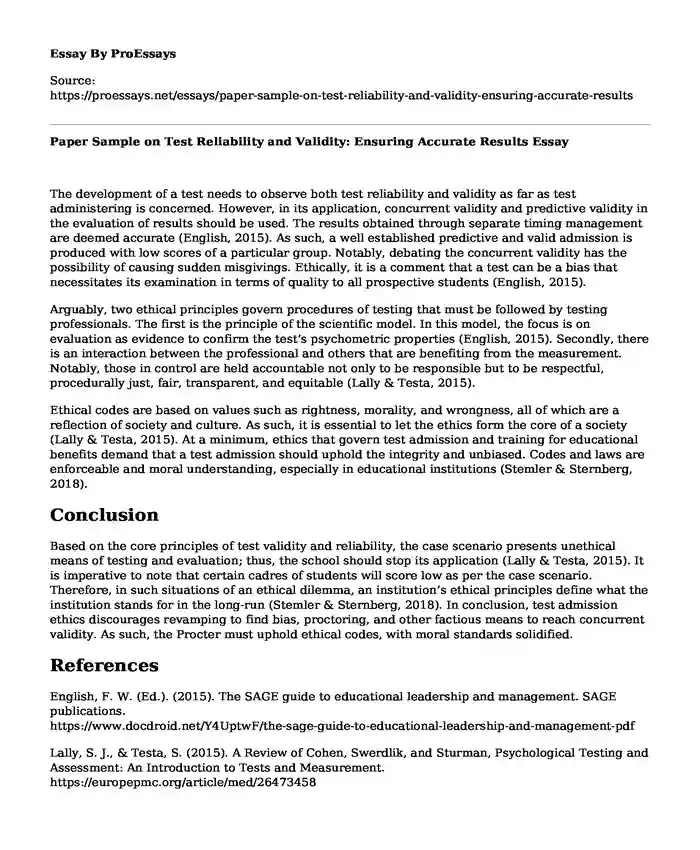The development of a test needs to observe both test reliability and validity as far as test administering is concerned. However, in its application, concurrent validity and predictive validity in the evaluation of results should be used. The results obtained through separate timing management are deemed accurate (English, 2015). As such, a well established predictive and valid admission is produced with low scores of a particular group. Notably, debating the concurrent validity has the possibility of causing sudden misgivings. Ethically, it is a comment that a test can be a bias that necessitates its examination in terms of quality to all prospective students (English, 2015).
Arguably, two ethical principles govern procedures of testing that must be followed by testing professionals. The first is the principle of the scientific model. In this model, the focus is on evaluation as evidence to confirm the test’s psychometric properties (English, 2015). Secondly, there is an interaction between the professional and others that are benefiting from the measurement. Notably, those in control are held accountable not only to be responsible but to be respectful, procedurally just, fair, transparent, and equitable (Lally & Testa, 2015).
Ethical codes are based on values such as rightness, morality, and wrongness, all of which are a reflection of society and culture. As such, it is essential to let the ethics form the core of a society (Lally & Testa, 2015). At a minimum, ethics that govern test admission and training for educational benefits demand that a test admission should uphold the integrity and unbiased. Codes and laws are enforceable and moral understanding, especially in educational institutions (Stemler & Sternberg, 2018).
Conclusion
Based on the core principles of test validity and reliability, the case scenario presents unethical means of testing and evaluation; thus, the school should stop its application (Lally & Testa, 2015). It is imperative to note that certain cadres of students will score low as per the case scenario. Therefore, in such situations of an ethical dilemma, an institution’s ethical principles define what the institution stands for in the long-run (Stemler & Sternberg, 2018). In conclusion, test admission ethics discourages revamping to find bias, proctoring, and other factious means to reach concurrent validity. As such, the Procter must uphold ethical codes, with moral standards solidified.
References
English, F. W. (Ed.). (2015). The SAGE guide to educational leadership and management. SAGE publications. https://www.docdroid.net/Y4UptwF/the-sage-guide-to-educational-leadership-and-management-pdf
Lally, S. J., & Testa, S. (2015). A Review of Cohen, Swerdlik, and Sturman, Psychological Testing and Assessment: An Introduction to Tests and Measurement. https://europepmc.org/article/med/26473458
Stemler, S. E., & Sternberg, R. J. (2018). The assessment of aptitude. https://www.researchgate.net/publication/307560476_The_assessment_of_aptitude.
Cite this page
Paper Sample on Test Reliability and Validity: Ensuring Accurate Results. (2023, Sep 25). Retrieved from https://proessays.net/essays/paper-sample-on-test-reliability-and-validity-ensuring-accurate-results
If you are the original author of this essay and no longer wish to have it published on the ProEssays website, please click below to request its removal:
- Happiness According to Aristotle
- Applying Evidence Based Practice in a Group: Adults in Recovery from Domestic Violence
- Research Paper on Refraining and Managing Stress in the 21st Century
- Paper Example on Important Aspects of the Performance Management System
- Article Analysis Essay on Nurse Burnout
- Essay Sample on Leadership: Encouraging Change in the Church
- Essay Sample on Leadership: Its Influence & Qualities







